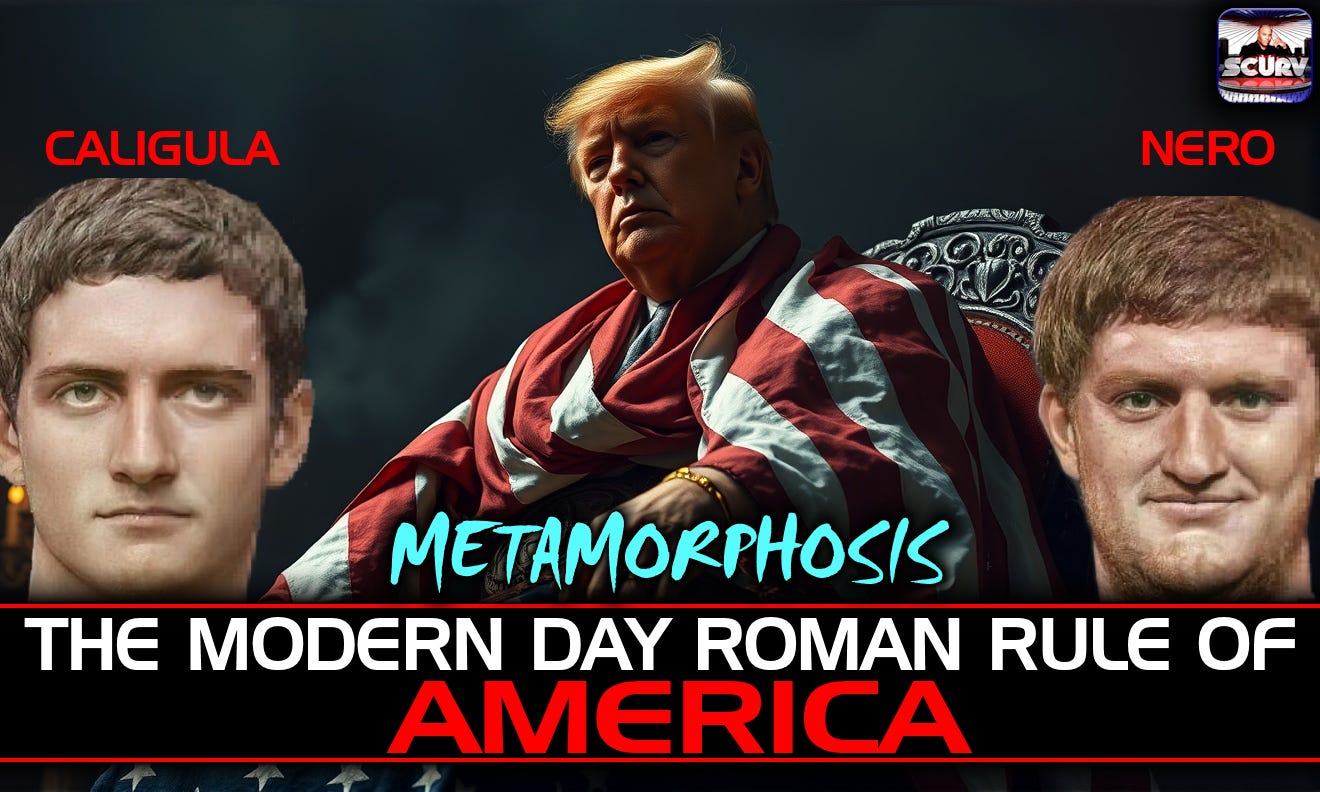AMERICA: MODERN DAY ROMAN RULE...
THE GHOSTS OF CALIGULA AND NERO
How the Spirit of Authoritarian Power Has Returned Through Donald Trump
Empires do not fall in a single day—they rot from the inside. They reach their height, proclaim their greatness, build monuments to their might, and then unravel under the weight of their own excess, corruption, and delusion. America stands at that precipice today, not as the shining city on a hill, but as a modern Rome—teetering in the last days of imperial arrogance. And at the center of this unfolding chapter is Donald J. Trump—channeling the ghosts of Rome’s most infamous emperors: Caligula and Nero.
This is not about partisan politics. This is about power unchecked. This is about a man who, like the emperors of old, rules not with balanced governance, but with ego, spectacle, and vengeance. The signs are not hidden; they are boldly displayed. And as history teaches us, those who refuse to acknowledge these patterns will be consumed by them.
The Imperial Persona: From President to Emperor
Donald Trump did not simply run for office—he sought a throne. His rallies were not political gatherings; they were royal courts where loyalty was demanded and dissent was ridiculed. Like Caligula, who declared himself a living god, Trump weaponized worship, not leadership. He did not simply want followers; he wanted believers.
Like Nero, whose vanity overshadowed governance, Trump reshaped the presidency into a stage for continuous adoration. Policy was secondary to power. Facts were redefined. Truth became optional. The presidency became a spectacle of dominance, punishment, and personal glory.
ICE as the Praetorian Guard
Every emperor needs an enforcement arm—Rome had the Praetorian Guard. Trump had ICE.
While immigration enforcement has existed for decades, Trump transformed ICE into a symbol of fear. Families were separated at borders. Children were held in cages. Policies were executed without clear strategy—only force. While illegal immigration is unquestionably a serious matter requiring legal process, Trump’s approach was not about law—it was about dominance. It was showmanship through cruelty, calibrated to energize his base.
This was not the method of a constitutional president—it was the signature of an emperor asserting his will over human rights.
Erratic Decisions, Unstable Rule
Caligula famously appointed his horse to the Roman Senate. Nero allegedly played music as Rome burned. Trump suggested injecting disinfectant into the body to cure disease. He shut down government operations over personal grudges. He openly threatened to use the military on American civilians exercising their right to protest. He praised dictators, attacked allies, and attempted to overturn an election result—actions no longer bound by democratic norms, but driven by personal authority.
These are not the traits of a stabilizing leader—they are the symptoms of imperial decay.
America’s 250-Year Threshold: The Hourglass Is Almost Empty
Historically, empires last approximately 250 years before collapse. America is approaching that marker. The Roman Empire, in its final stages, was ruled by unstable, flamboyant emperors who placed personal glory above the survival of the state. Caligula indulged in chaos. Nero attacked his own people and persecuted his critics. Likewise, Trump has reintroduced the spirit of authoritarian rule at a time when America is most fragile—economically strained, socially polarized, and internationally isolated.
Rather than fortify the foundation of the nation, Trump’s governance style accelerates the fault lines. Where unity is needed, division is sown. Where diplomacy is required, confrontation is chosen. Where introspection could lead to healing, ego demands conflict.
The Illusion of Strength Masking National Decline
To many, Trump’s aggressive persona was mistaken for strength. But emperors like Caligula and Nero were also seen as strong—until their excesses brought Rome to its knees. Trump’s most vocal supporters believed he would restore America’s greatness, yet his decisions often undermined its global standing and moral legitimacy.
He withdrew from international agreements without alternative strategies.
He escalated trade wars without economic safeguards.
He destabilized relationships with allies while praising authoritarian leaders abroad.
He pushed policies that benefited the wealthy while promising relief to the working class.
These are not the actions of a reformer. These are the signs of imperial rule.
A Nation on the Edge
America today mirrors Rome in its twilight:
Spectacle over substance
Ego over ethics
Political theater over policy
Division over unity
We are witnessing the reemergence of imperial governance—where the leader stands not as servant of the people, but as ruler over the people.
History is speaking, and it is warning: when leaders channel the ghosts of Caligula and Nero, the empire does not rise—it falls.
The Final Act of the American Empire
Donald Trump is not the creator of America’s downfall—he is the manifestation of it. He is the symptom of a nation that has drifted too far from its founding ideals and too deep into the waters of hubris and empire-building. Whether one supports him or not, the undeniable reality is that America under Trump began to resemble ancient Rome in its dying days: a nation intoxicated by spectacle, blinded by arrogance, and prepared to sacrifice democracy at the altar of power.
As we approach the final stretch of America’s historical life cycle, the question remains: will the nation recognize the ghosts that have returned—or will it, like Rome before it, fall under the rule of those who burn the house down just to watch the flames?
The empire is trembling. The ghosts have returned. And history is watching.



